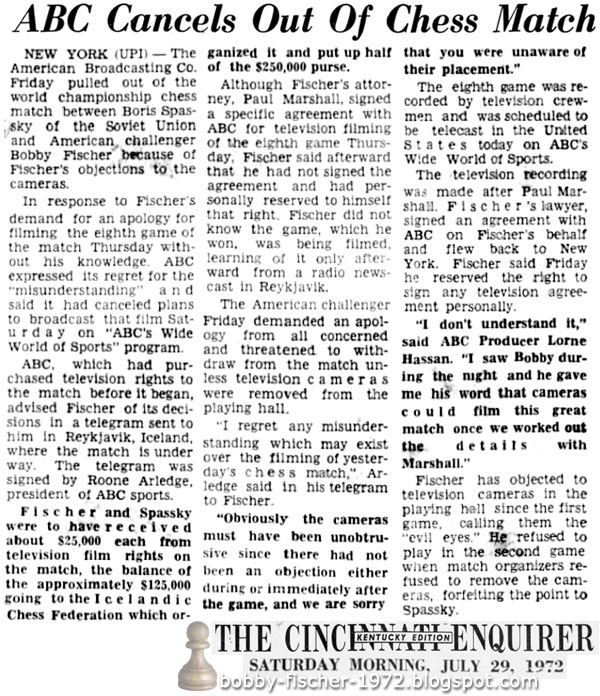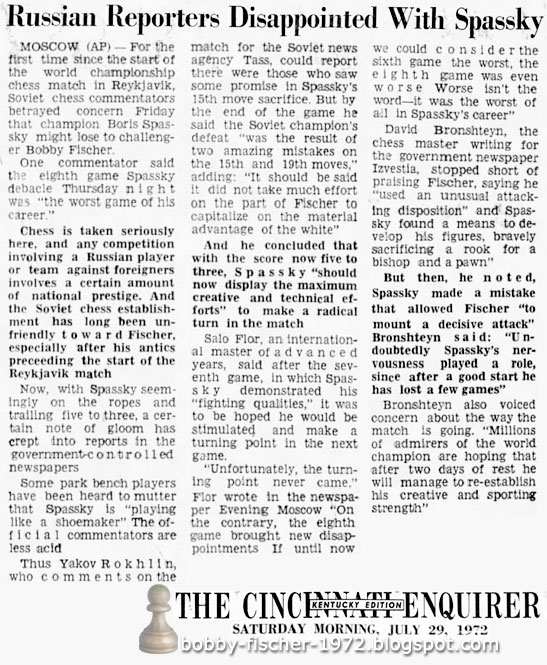The Cincinnati Enquirer Cincinnati, Ohio Saturday, July 29, 1972 - Page 14
ABC Cancels Out Of Chess Match
New York (UPI)—The American Broadcasting Co. Friday pulled out of the world championship chess match between Boris Spassky of the Soviet Union and American challenger Bobby Fischer because of Fischer's objections to the cameras.
In response to Fischer's demand for an apology for filming the eighth game of the match Thursday without his knowledge. ABC expressed its regret for the “misunderstanding” and said it had canceled plans to broadcast that film Saturday on “ABC's Wide World of Sports” program.
ABC, which had purchased television rights to the match before it began, advised Fischer of its decisions in a telegram sent to him in Reykjavik, Iceland, where the match is under way. The telegram was signed by Roone Arledge, president of ABC Sports.
Fischer and Spassky were to have received about $25,000 each from television film rights on the match, the balance of the approximately $125,000 going to the Icelandic Chess Federation which organized it and put up half of the $250,000 purse.
Although Fischer's attorney, Paul Marshall, signed a specific agreement with ABC for television filming of the eighth game Thursday, Fischer said afterward that he had not signed the agreement and had personally reserved to himself that right. Fischer did not know the game, which he won, was being filmed, learning of it only afterward from a radio newscast in Reykjavik.
The American challenger Friday demanded an apology from all concerned and threatened to withdraw from the match unless television cameras were removed from the playing hall.
“I regret any misunderstanding which may exist over the filming of yesterday's chess match,” Arledge said in his telegram to Fischer.
“Obviously the cameras must have been unobtrusive since there had not been an objection either during or immediately after the game, and we are sorry that you were unaware of their placement.”
The eighth game was recorded by television crewmen and was scheduled to be telecast in the United States today on ABC's Wide World of Sports.
The television recording was made after Paul Marshall, Fischer's lawyer, signed an agreement with ABC on Fischer's behalf and flew back to New York. Fischer said Friday he reserved the right to sign any television agreement personally.
“I don't understand it,” said ABC Producer Lorne Hassan. “I saw Bobby during the night and he gave me his word that cameras could film this great match once we worked out the details with Marshall.”
Fischer has objected to television cameras in the playing hall since the first game, calling them the “evil eyes.” He refused to play in the second game when match organizers refused to removed the cameras, forfeiting the point to Spassky.
The Cincinnati Enquirer, Cincinnati, Ohio, Saturday, July 29, 1972 - Page 14
Russian Reporters Disappointed With Spassky
Moscow (AP)—For the first time since the start of the world championship chess match in Reykjavik, Soviet chess commentators betrayed concern Friday that champion Boris Spassky might lose to challenger Bobby Fischer.
One commentator said the eighth game Spassky debacle Thursday night was “the worst game of his career.”
Chess is taken seriously here, and any competition involving a Russian player or team against foreigners involves a certain amount of national prestige. And the Soviet chess establishment has long been unfriendly toward Fischer, especially after his antics preceding the start the start of the Reykjavik match.
Now, with Spassky seemingly on the ropes and trailing five to three, a certain note of gloom has crept into reports in the government controlled newspapers.
Some park bench players have been heard to mutter that Spassky is “playing like a shoemaker.” The official commentators are less acid.
Thus Yakov Rokhlin who comments on the match for the Soviet news agency Tass, could report there were those who saw some promise in Spassky's 15th move sacrifice. But by the end of the game he said the Soviet champion's defeat “was the result of two amazing mistakes on the 15th and 19th moves,” adding: “It should be said it did not take much effort on the part of Fischer to capitalize on the material advantage of the white.”
And he concluded that with the score now five to three, Spassky “should now display the maximum creative and technical efforts” to make a radical turn in the match.
Salo Flor, an international master of advanced years, said after the seventh game, in which Spassky demonstrated his “fighting qualities” it was to be hoped he would be stimulated and make a turning point in the next game.
“Unfortunately, the turning point never came.” Flor wrote in the newspaper Evening Moscow “On the contrary, the eighth game brought new disappointments. If until now we could consider the sixth game the worst, the eighth game was even worse. Worse isn't the word—it was the worst of all in Spassky's career.”
David Bronstein, the chess master writing for the government newspaper Izvestia, stopped short of praising Fischer, saying he “used an unusual attacking disposition” and Spassky found a means to develop his figures, bravely sacrificing a rook for a bishop and a pawn.”
But then, he noted, Spassky made a mistake that allowed Fischer “to mount a decisive attack.” Bronstein said: “Undoubtedly Spassky's nervousness played a role, since after a good start he has lost a few games.”
Bronstein also voiced concern about the way the match is going. “Millions of admirers of the world champion are hoping that after two days of rest he will manage to re-establish his creative and sporting strength.”

























